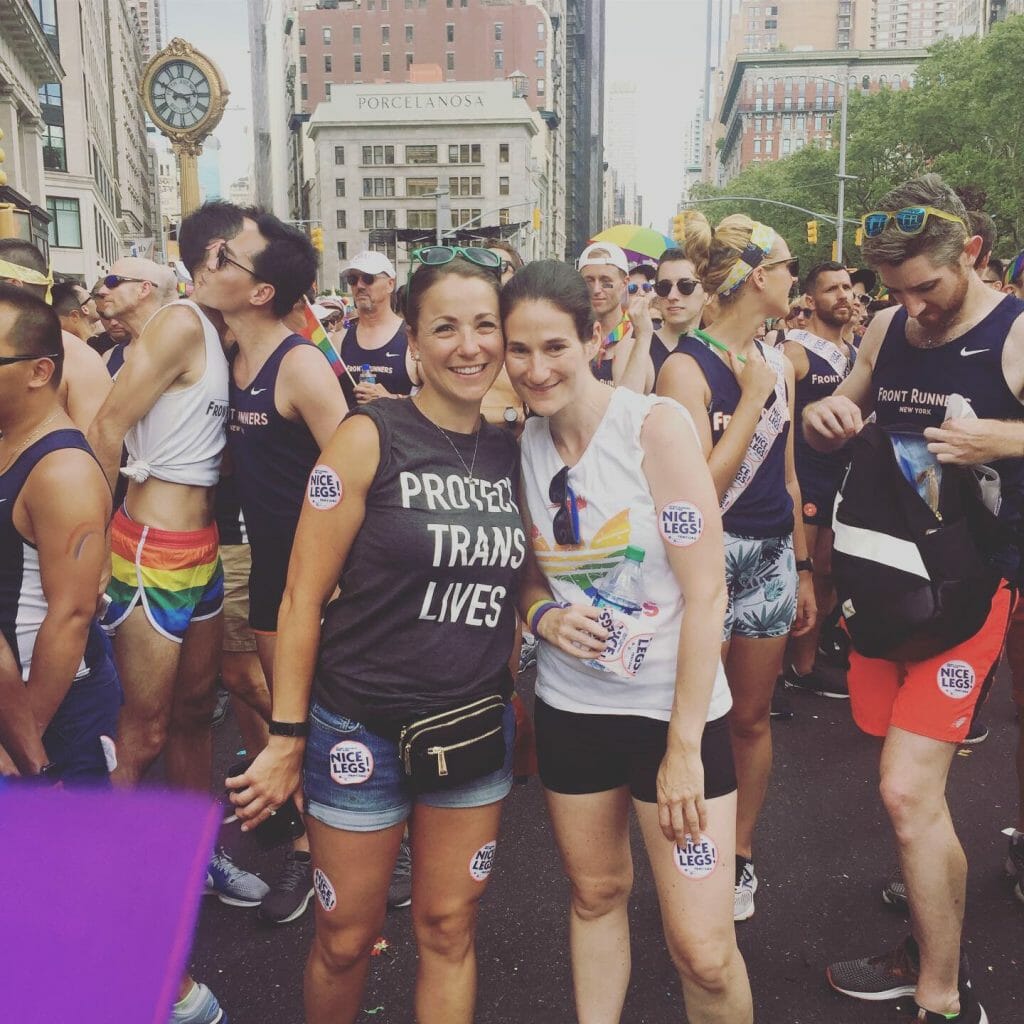When I say that running saved my life, I mean exactly that. As a deeply closeted queer kid in the suburbs, I felt lost until I decided, on a whim, that I’d try out for the Cross Country team when I started high school in the Fall. In running, I found the space to be alone with myself, test what I thought I was capable of, and fly past a finish line knowing I’d given the very best of me.
In the decades since, running has been my therapy and consolation through heartbreak, grief, anxiety and depression. After an especially devastating breakup a few years ago, I joined a LGBTQ running club. Hundreds of miles, a few personal records, and many laps of Central Park spent chatting with new friends later, I was struck by how running has continued to be the best gift I was ever given.
I can’t imagine my life without running. And so every time I hear about another state bill threatening to ban transgender kids from competing in sports, it breaks my heart. From Andraya Yearwood and Terry Miller who are targets of a lawsuit in Connecticut, to Lindsay Hecox in Idaho who now faces the most restrictive ban against transgender athletes in the country, these are girls who, like me years ago, found an outlet for their pain and teammates that support and motivate them. Especially right now, many trans youth are isolated from their friends, and some are in homes where they’re not accepted for who they are. Running has always been there for them, and now there are lawmakers trying to take that away.
I know that many people haven’t met a transgender person, or don’t know that they have. Transgender kids are just like all kids, in that they want to be happy and fully who they are. Hiding their true self is painful, and even life-threatening — transgender youth who aren’t able to come out, or who do are met with abuse and harassment, are more likely to experience depression and to attempt suicide.
After the Boston Marathon adopted policies for transgender inclusion, champion runner Paula Radcliffe used her tremendous influence and platform to say that allowing trans athletes to compete “makes a mockery” of gender categories. What makes a mockery of gender categories is the fact that girls are rarely given the financial resources, cultural support, role models, and fierce allies in sport that boys are. This is especially true for the most marginalized girls in sport, including trans girls.
What we have yet to see is a prominent runner speaking up for transgender inclusion, for equality, and for the right of every human being who loves running to be able to run, exactly as who they are. Instead, the media is dominated by narratives about the “threat” transgender women and girls pose to women’s sports as a whole.
As a cisgender female athlete, I’ve seen a lot of threats to girls and women’s sports, from sexual harassment to unequal pay and a lack of women coaches. Expanding access, and allowing trans girls and women to participate, actually makes our sport stronger. Institutions like the NCAA and the International Olympic Committee drew from extensive research and expert guidance to develop guidelines for transgender inclusion that maximize safety and fairness for everyone, and those policies have been in place for years now. Even with those guidelines in place, we have never seen a transgender athlete in the Olympics. Myths about trans girls and women taking over sports are simply that — myths.
The best part of my day, especially in quarantine, is the moment I’m a few steps into my evening run. The trees fade to a blur and the only soundtrack I need is my breath and footsteps. Sometimes this is the only time of the day when I feel fully myself and a part of the world. When I say that running has saved my life, I mean that all of us deserve a chance to live.
Joanna Hoffman is the Communications Director at Athlete Ally and a member of Front Runners New York. Her full-length book of poetry, Running for Trap Doors, was nominated for a Lambda Literary Award and featured in the American Library Association’s list of recommended LGBT reading for 2014. In 2015, she was named a White House Champion of Change for LGBT advocacy through art. Her work has appeared in Upworthy, Buzzfeed, Winter Tangerine, decomP, PANK, The Offing, Union Station Magazine, The Legendary, Sinister Wisdom and in the Write Bloody Publishing anthologies We Will be Shelter and Multiverse.
To learn more about how to be an ally to trans people and athletes, here are some resources:
Ally Voices:
USA Rugby’s Naima Reddick: Let Trans Women Play
Sky Blue FC’s Imani Dorsey on Trans Inclusion
Wrestler Justice Horn: End the War on Trans Student Athletes
Sports Saved My Life. Transgender Athletes Should Be Able to Have That Experience Too
Trans Athlete Voices:
British driver Charlie Martin on being out in motosports
WNBA Hopeful Kayla Ward to Trans Youth: You Aren’t Alone
Erica Meacham, Women’s Tackle Football Oregon Hawks on trans inclusion
Hockey is for Everyone: Elliot’s Story
Overview / Background Articles:
The Truth About Trans Athletes (Men’s Health)
Four Myths About Trans Athletes Debunked (ACLU)
Andraya Yearwood Knows She Has the Right to Compete (Bleacher Report)
CT High School Track Athletes Respond to Discrimination Complaint (Boston.Com)
Stop Talking about Testosterone, There’s No Such Thing as ‘True Sex’ (The Guardian)
Trans Athletes Welcomed on Teams Despite Hostile State Bills (NewNowNext)
This Documentary is Changing the Conversation around Trans Athletes (NYLON)













